| Look up Walloon in Wiktionary, the free dictionary. |
Walloon may refer to:
- Walloons, a French-speaking population of Belgium
- Walloon language
- Walloon Region or Wallonia in Belgium
- Walloon Lake
- Walloon, Queensland
| Look up Walloon in Wiktionary, the free dictionary. |
Walloon may refer to:
| This disambiguation page lists articles associated with the title Walloon. If an internal link led you here, you may wish to change the link to point directly to the intended article. |

Walloons are a Romance ethnic group native to Belgium, principally its southern region of Wallonia, who primarily speak langues d'oïl such as Belgian French, Picard and Walloon. Walloons are a distinctive ethnic community within Belgium. Important historical and anthropological criteria bind Walloons to the French people.
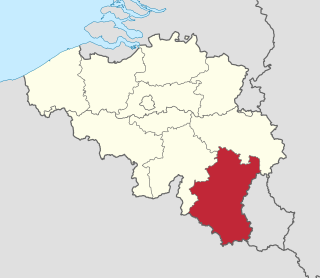
Luxembourg, also called Belgian Luxembourg, is the southernmost province of Wallonia and of Belgium. It borders on the country of Luxembourg to the east, the French departments of Ardennes, Meuse and Meurthe-et-Moselle to the south and southwest, and the Walloon provinces of Namur and Liège to the north. Its capital and largest city is Arlon, in the south-east of the province.
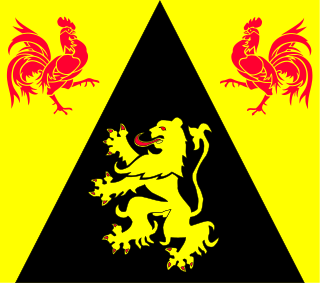
Walloon Brabant is a province of Wallonia and Belgium. It borders on the province of Flemish Brabant and the provinces of Liège, Namur and Hainaut (Wallonia). Its capital and largest city is Wavre.

The Walloon Region, usually simply referred to as Wallonia is one of the three regions of the Kingdom of Belgium—alongside the Flemish Region and the Brussels-Capital Region.

Belgium is a federal state comprising three communities and three regions that are based on four language areas. For each of these subdivision types, the subdivisions together make up the entire country; in other words, the types overlap.

The country of Belgium is divided into three regions. Two of these regions, the Flemish Region or Flanders, and Walloon Region, or Wallonia, are each subdivided into five provinces. The third region, the Brussels Capital Region, is not divided into provinces, as it was originally only a small part of a province itself.
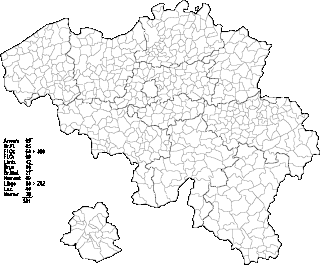
Belgium comprises 581 municipalities grouped into five provinces in each of two regions and into a third region, the Brussels Capital Region, comprising 19 municipalities that do not belong to a province. In most cases, the municipalities are the smallest administrative subdivisions of Belgium, but in municipalities with more than 100,000 inhabitants, on the initiative of the local council, sub-municipal administrative entities with elected councils may be created. As such, only Antwerp, having over 500,000 inhabitants, became subdivided into nine districts. The Belgian arrondissements, an administrative level between province and municipality, or the lowest judicial level, are in English sometimes called districts as well.
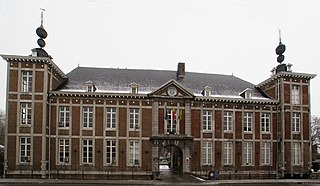
Flémalle is a Walloon municipality located in the Belgian province of Liège. On January 1, 2006, Flémalle had a total population of 25,140. The total area is 36.68 km² which gives a population density of 685 inhabitants per km².
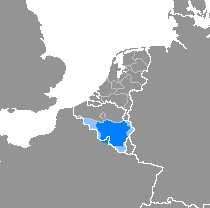
Walloon is a Romance language that is spoken in much of Wallonia in Belgium, in some villages of northern France and in the northeast part of Wisconsin, US until the mid-20th century and in some parts of Canada. It belongs to the langue d'oïl language family, the most prominent member of which is the French language. The historical background of its formation was the territorial extension since 980 of the Principality of Liège to the south and west.

The Parliament of Wallonia is the legislative body of Wallonia, one of the three self-governing regions of Belgium. The parliament building, the former Hospice Saint-Gilles, is situated in Namur, the capital of Wallonia, at the symbolic confluence of the Meuse and the Sambre, the two main rivers of the most inhabited parts of Wallonia, the Sillon industriel. On the other side of the Meuse, facing the Parliament, is the Élysette, the seat of the Government of Wallonia.

In Belgium, the French Community refers to one of the three constituent constitutional linguistic communities. Since 2011, the French Community has used the name Wallonia-Brussels Federation, which is controversial because its name in the Belgian constitution has not changed and because it is seen as a political statement. The name "French Community" refers to Francophone Belgians, and not to French people residing in Belgium. As such, the French Community of Belgium is sometimes rendered in English as "the French-speaking Community of Belgium" for clarity, in analogy to the German-speaking Community of Belgium.

Le Chant des Wallons(The Song of the Walloons) is the anthem of Wallonia (Belgium).

Belgians are people identified with the Kingdom of Belgium, a federal state in Western Europe. As Belgium is a multinational state, this connection may be residential, legal, historical, or cultural rather than ethnic. The majority of Belgians, however, belong to two distinct ethnic groups or communities native to the country, i.e. its historical regions: Flemings in Flanders, who speak Dutch, and Walloons in Wallonia, who speak French or Walloon. There is also a substantial Belgian diaspora, which has settled primarily in the United States, Canada, France, and the Netherlands.

The Walloon Legion was a collaborationist military formation recruited among French-speaking volunteers from German-occupied Belgium, notably from Brussels and Wallonia, during World War II. It was formed in the aftermath of the German invasion of the Soviet Union and fought on the Eastern Front as part of the German Army (Wehrmacht) and later the Waffen SS alongside similar formations from other parts of German-occupied Europe.
Because Belgium is a multilingual country, Belgian literature is divided into two main linguistic branches following the two most prominently spoken languages in the country - Dutch and French. German is the third language in Belgium and is spoken by a small community of about 70,000 German-speakers of the German-speaking Community of Belgium bordering on Germany.

Ultratop is an organization which generates and publishes the official record charts in Belgium. Ultratop is a non-profit organization, created on the initiative of the Belgian Entertainment Association (BEA), the Belgian member organization of the International Federation of the Phonographic Industry. Two parallel set of charts are concurrently produced and published, one on behalf of Belgium's mainly Dutch-speaking Flanders region, and the other catering to the nation's mainly French-speaking region of Wallonia.
The Walloon Rally is a regionalist political party in Belgium, active in Wallonia since 1968. The party favoured federalism and since 1985 independence.
Belgium participated at the Eurovision Song Contest 2003 in Riga, Latvia. This was the first Walloon participation since the 2000 contest.
The Walloon Movement is an umbrella term for all Belgian political movements that either assert the existence of a Walloon identity and of Wallonia and/or defend French culture and language within Belgium, either within the framework of the 1830 Deal or either defending the linguistic rights of French-speakers. The movement began as a defence of the primacy of French but later gained political and socio-economic objectives. In French, the terms wallingantisme and wallingants are also used to describe, sometimes pejoratively, the movement and its activists.
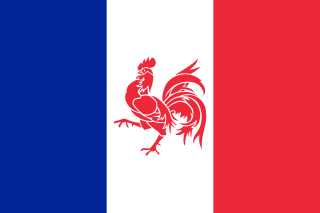
Rattachism or Reunionism (Réunionisme) is a minor political ideology which calls for the French-speaking part of Belgium or Wallonia to secede from the state of Belgium and become part of France. Brussels, which is majority French-speaking but enclaved in Flanders, may be included within this ideology as may the six Flemish municipalities with language facilities for French-speakers around Brussels. It can be considered a French-speaking equivalent of Orangism or Grootneerlandisme in Flanders.